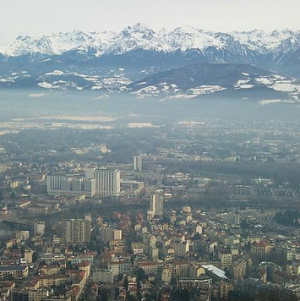
Books and Ideas: Among the issues related to "sustainable development", the ones related to the climate are conspicuous: how is the climate factor involved in the notion of "sustainable city"? Is there a correlation between city and climate?
Mireille Lauffenburger: The climate has very particular characteristics on a city scale. For example, you can talk of the "urban climate", both micro-local (a street), local or topoclimatic (city) level. On the other hand, the more extensive is the territory of a densely populated agglomeration, the more solar energy it can capture and display it as heat. In this regard, the most noticeable climate affectation in urban areas is the temperature difference between urban and peri-urban and rural areas. This phenomenon is called "urban heat island effect". The urban heat island effect goes decreasing from the dense urban centre towards the periphery. An estimated annual average temperature difference between the centre of a city and its periphery is generally between 2 and 3º.
Books and Ideas: Which factors explain the formation of urban heat island?
Mireille Lauffenburger: Intense urban activity essentially explains the change in temperature by heat emission, but the morphology of cities is also a determining factor. The size, shape and layout of the buildings and the axes of movement modify in particular ways the solar input, airflow and therefore the balance of clean energy in an urban area. If the buildings, forming "masks", multiply the shadows on a street scale, thereby offering potential cooling -used since ancient times in the Mediterranean Medinas- the importance of mineral surfaces that absorb heat, and the decreased wind speed in urban areas -as a result of the high surface roughness of urban agriculture in relation to the surroundings- all contribute substantially to the formation of urban heat islands.
Books and Ideas: Why is the urban heat island effect an ecological challenge?
Mireille Lauffenburger: The urban heat island effect results in a warmer layer at altitude that is rich in pollutants, which takes the form of a mushroom or plume moved by the winds. The importance of mineral surfaces and the decrease of the wind speed in cities cause increased heat perceptible by the human body. The urban heat island effect has more of an environmental impact. In Paris, the urban heat island has significant health impact. It is not only related to increased pollution from the concentration of contaminating elements and lack of air circulation and (usually) westerly winds, but also -in the case of powerful dynamic anticyclones developing and stable- for average temperatures that are very high for many consecutive days. In climatology, these exceptional episodes are called "heat waves" or "dog days". The direct consequence of these heat waves on health is increased mortality.
Books and Ideas: In consequence, the environmental issue is a double health problem?
Mireille Lauffenburger: Absolutely. in recent years, in France we have lived through two especially scorching episodes. One happened in July 2006. But the most dramatic was the heat wave from the 1st to 15th August 2003, because its occurrence caused the death of nearly 15,000 people throughout the country. At the peak of this wave, the weather service recorded a positive temperature difference of 8º in Paris in relation to its north-western periphery. This difference did significantly increase the value of the maximum daily temperature that was experienced in the central part of the agglomeration. The duration and intensity of this heat wave had highlighted before the vulnerability of Paris to these scorching episodes. Indeed, the contribution of Paris was important to deaths: 1,254 deaths, representing 8.5% of all deaths nationwide, while Paris has only 3.7% of the population.







